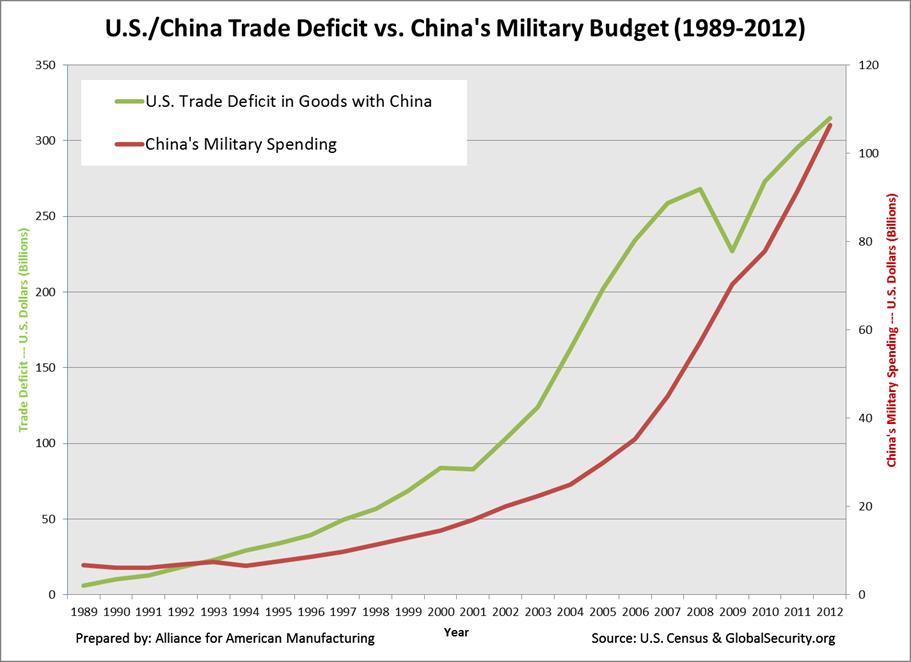On a press call yesterday in advance of this week's "summit" between President Obama and Chinese President and General Secretary of the Communist Party Xi Jinping, Alliance for American Manufacturing's (AAM) Scott Paul called for consequences for China's trade violations, computer hacking and theft of intellectual property. Meanwhile, trade deficit figures were released today, and the monthly U.S. goods deficit with China climbed to $24.1 billion in April, up from $17.9 billion in March. The 2012 trade deficit with China was a record $315 billion.
Need A Larger Approach To Trade Deficit
On the call Paul said that China has been picking up the pace of acquiring foreign currency reserves, to an amount matching the height of currency manipulation in 2007. China imposes impediments to importing, while subsidizing its exports in various ways. He said there has to be real consequences to China for their various trade violations, hacking and IP theft or they won't stop. "Unless you hit China in the wallet it has no incentive to improve the environment," he said. "Many in Congress are losing patience as well."
Paul said that the Obama administration has been good on trade cases that have been brought to its attention, but when you look at the data on surging Chinese imports, you have to conclude that we need a more macro approach, with goals to reduce trade deficit, and potential consequences with China if the goals are not met. Paul said he is weary and tired of continued U.S./China summitry that result in new agreements that are just updated promises that China has made since 2001.
Paul said that legislation will be reintroduced in the Senate this month to do something about China's continuing currency manipulation. He predicted it will again pass the Senate, and he urges House Speaker John Boehner to allow a vote this time. This morning Ohio Senator Sherrod Brown sent a press release promising to reintroduce this legislation. “As our trade deficit continues to widen, our need to level the playing field for American manufacturers and workers becomes more urgent,” Brown said in the release. “Yet instead of taking action, we’re pursuing trade deals with countries that manipulate currencies. Congress won’t let these agreements move without finally imposing penalties on foreign nations that cheat trade laws by manipulating currency.”
Paul also urged the President not to take the advice he is getting to set aside issues on which the U.S. and China do not agree.
Does China Hold All The Cards?
In response to a question on what happens if we confront China, Paul said it is myth that China holds all the cards and we can’t get more aggressive. It would inflict severe damage to China's economy if they stopped financing U.S. debt because they depend on our market and get many benefits. If the administration took a stronger approach, backed by Congress, we would see results. We do export to China but some of those are irreplaceable, so we don't need to fear China cutting off those products. "We actually hold the cards."
Investment In U.S. Companies
Another questioner asked about China's increasing purchases of U.S. companies. Paul responded that such investment, if done responsibly, is a good thing – if it is not subsidized.
There is a problem with state-owned enterprise investment in U.S. companies, bringing an investor to U.S. soil that has no cost of capital because it is provided by the state, but is competing for markets and capital here. That creates a different metric, where they have a huge advantage. There has to be an exceptional amount of reciprocity for Chinese investment – where we have equal possibilities for investment in China.
But we have legitimate national security concerns about some proposed acquisitions. For example, does the recent $4.7 billion purchase of pork-producer Smithfield have an impact on U.S. food security? What are the priorities of this new pork conglomerate: will it be servicing China or the U.S., and will it drive up U.S. costs?
National Security Concerns
There was a question on AAM's report of U.S. defense relying on China. AAM recently released a study, <a href="http://americanmanufacturing.org/press-releases/report-says-us-military-dangerously-dependent-foreign-suppliers">Remaking American Security: Supply Chain Vulnerabilities & National Security Risks Across the U.S. Defense Industrial Base, authored by Guardian Six Consulting President Brigadier General John Adams. The report showed how our national security is in jeopardy because of an overreliance on foreign suppliers for critical defense materials. "Foreign sourcing puts America’s military readiness in the hands of potentially unreliable supplier nations and undermines the ability to develop capabilities needed to win on future battlefields."
The report called for an increase in domestic production of the natural resources and manufactured goods for our military.
AAM has also released this chart illustrating how our trade deficit finances China's military expansion:

"Time For Talk Is Over"
Accompanying the call, AAM released a letter sent from Scott Paul to President Obama in advance of this week's meetings saying, "The time for talk is over; the time for action is here."
The letter lists a number of national security concerns, from "dangerous dependence on foreign suppliers for the raw materials, parts, and finished products needed for our national defense" to reports of Chinese computer hacking to obtain "critical U.S. weapons system designs." These reports "identify a clear and present danger posed by Chinese activities." Chinese hacking has also infltrated our commercial enterprises to steal key technology and industrial secrets, and our critical infrastructure computer systems. It is worth reading the entire letter.
24th Anniversary Of Tianamen Square Massacre
Note: Today is the 24th anniversary of the Tianamen Square Massacre of students protesting for democracy, killing an unknown number of people, with varying estimates of up to 2,600 dead and as many as 7,000 wounded. Following the massacre in Beijing, the government launched a widespread crackdown on democracy advocates.
-----
Follow me and CAF on Twitter:



